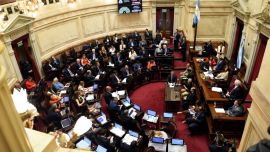As the sexual allegations against TV star Juan Darthés dominated Argentina’s media landscape this week, evoking strong reactions from all sides, President Mauricio Macri came forward with his own governmental responses which, despite their value as political gestures, may not have the financial backing to become reality.
First, on a more symbolic level, an advertisement campaign video against gendered violence created by the Ministry of Social Development back in 2016, in which Darthés had participated, was removed from circulation. The video included many well-known local celebrities telling the camera the different ways in which gendered violence can manifest, with the overall point that it doesn’t have to be extreme to be considered abuse.
The removal the video was carried out by the head of the National Women’s Institute (INAM), Fabiana Túnez, but President Macri later took to Twitter to confirm the fact and explain the move: “Out of respect for Thelma Fardín’s [legal] complaint against Juan Darthés we have decided to remove the [advertising] spot published against gender violence from these networks [sic] in which the accused had taken part.”
In a follow-up tweet, Macri said that the government’s “commitment is to work to eradicate all forms of violence against women.”
Second, the president announced a new “Plan for Equal Opportunity and Rights, 2018-2020” (PIOD) on Friday with 35 proposals set to be based around three axes: physical autonomy, financial autonomy and economic empowerment, and gender violence. Addressing a crowd, Macri commended the bravery of the women that have come forward, saying that: “We shouldn’t be afraid of the truth ... what we thought was natural isn’t right, especially within men’s outlook.” This announcement followed an extraordinary session held in the Senate on Thursday with flags and posters reading #MiraComoNosPonemos, the emblematic hashtag that spread across social networks this week, pinned on benches as senators gave their support.
However, the national budget established for 2019 does not necessarily reflect that commitment. Although it included a new category, “Presupuesto con Perspectiva de Género (PPG),” which allows for more transparency, this enabled analysts to identify that only 0.13 percent of the national budget has been dedicated to funding the fight against gender inequality and violence. Funds allocated to the INAM specifically only increased by 10.9 percent, from 211 million to 234 million pesos, which is an increase far below the projected inflation rates for 2018 and 2019, which could imply a net loss of around 18 percent.
According to an analysis carried out by the Latin American Team of Justice and Gender (ELA) on the 2019 budget, the rights of women are being affected by the austerity measures that are set to be implemented. The organisation defines human rights as “interdependent,” so cuts to public services “affect healthcare, education and caring services, which ultimately burden women.” This implies that any achievements in the workplace — which are difficult per se, given economic gender inequalities in the national context of inflation and decreased economic activity — are likely to be eroded by having to deal with difficulties outside of working hours.
The ELA study also outlines that very few resources were assigned to the economic empowerment of women both at the ministerial level and when it comes to programmes such as “Haciendo Futuro Juntas” (“Making the future together”).
Moreover, the budget projects a reduction of funds for organisations and programmes that establish gender policy and fight against gender inequality. These include the aforementioned INAM and the “Haciendo Futuro Juntas,” but also telephone helplines run by the Justice Ministry and the National Plan of Action for the Prevention, Assistance and Eradication of Violence (PNA). This is surprising when considering the new PIOD plan, which considers physical autonomy and gendered violence as key thematic areas.
It could be argued that the PIOD may be an attempt to streamline efforts against gendered violence and inequality, but funding new programmes from scratch may be difficult when established institutions and programmes are already underfunded.
The announcements made by the Macri administration show signs of a political will to fight against gender inequality. In addition, the 2019 national budget shows signs of the new commitment to gender equality. However, given that it established significant disadvantages for existing institutions and programmes and, more notably, was approved by the Congress just last month, the strength of that political will may be called into question amid the problems surrounding Argentina’s national finances. Maybe next year.




















Comments